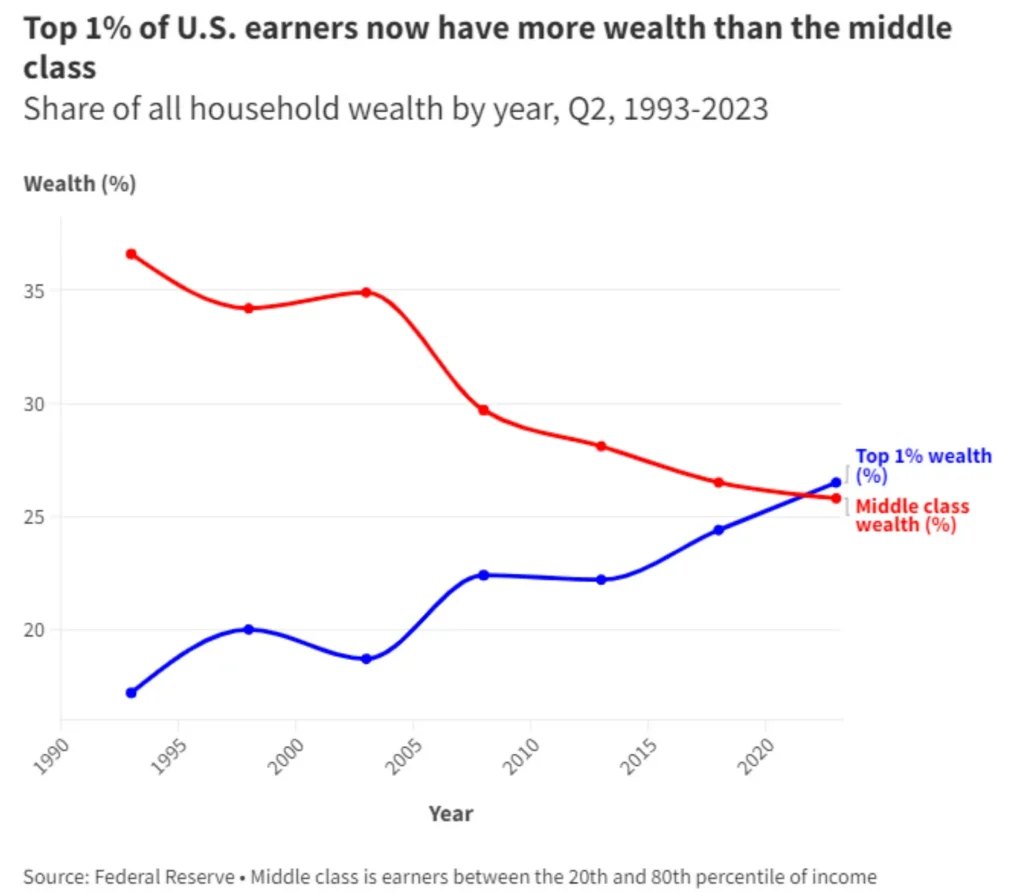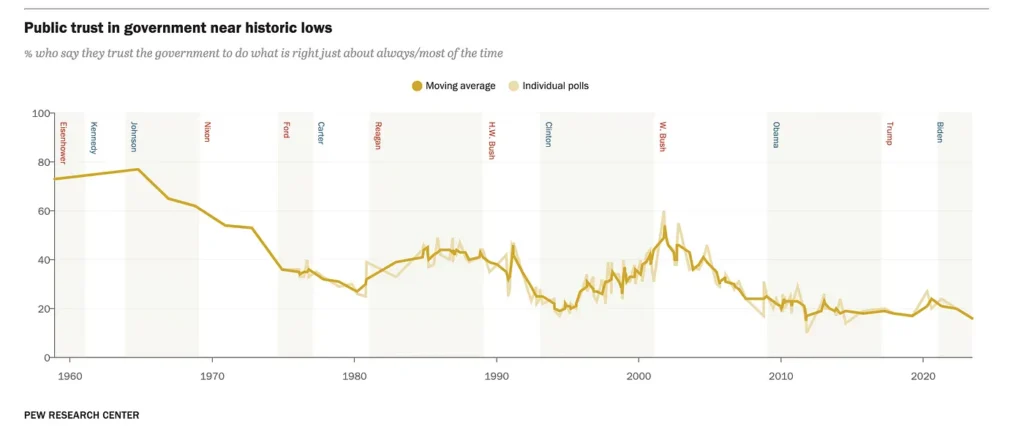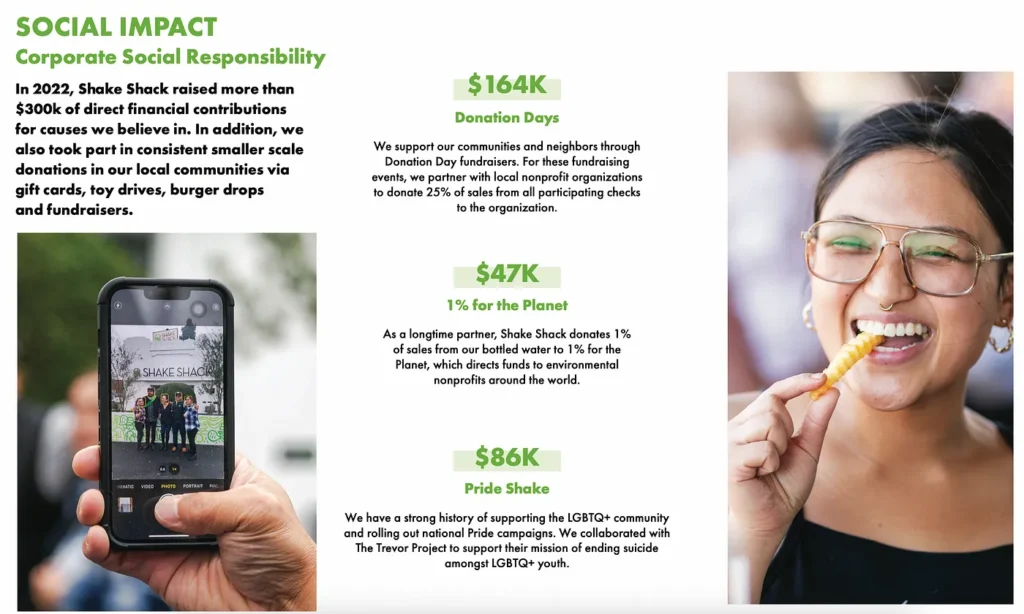- Stephen Haugse
- Climate Action, Climate Change
- 0 Comments
- 512 Views
Over 40 million Americans suffer from food insecurity. Over 75% of Gen-Z are hesitant to invest long-term. Only 20% of Americans are satisfied with the US Government. Roughly 78% of Americans live paycheck to paycheck.
With so much going on in our day-to-day lives, when does someone who is suffering from food insecurity have the capacity to care about climate change? The short answer is that they don’t. The steadily growing wealth disparity has created a society that benefits a very small percentage and neglects the rest. That’s the trap we’re in. So, how do we break out of it?
Coventry is a city with a thousand years of history that has plenty to offer the visiting tourist. Located in the heart of Warwickshire

Seemingly in correlation to the widening gap in wealth disparity, public trust in government has decreased to an all time low. It would be rational to see direct cause and effect here…

In an article by Ewan Morrison in Psychology Today titled ‘Have we Overburdened Gen Z with Fears of the Future?’, Morrison opens with,
My wife was talking to my 21-year-old daughter the other day and asked, ‘Are you OK? You and your friends seem a bit lost.’
My daughter replied, ‘We’re not lost. We’re just really angry.’
‘Why?’
‘Because the World’s going to end,’ my daughter said, ‘because what’s the point of anything?’ [emphasis added]
This conversation sums up the consensus amongst Gen Z and Millennials about their future. Many Gen Z have taken the position of making the most out of everyday because there is no point in saving at this point in time. Rather than cutting away a little bit each month, many young adults are opting for living life to the fullest now — which equates to higher spending and lower savings. The overall mentality around saving being, “what’s the point?”
Lack of Viral Climate Content
Without a positive outlook on the future and hardships that have been exacerbated by the Covid19 pandemic, the focus for many has turned to looking after numero uno. When you are struggling to make ends meet while simultaneously hearing about absurd spending by the 0.01% — and little to no conversation by the 0.01% about climate change — it makes sense that one would lose hope.
Many of the biggest influencers are also out of the conversation, making a hard conversation to get started basically a non-starter. And, because most of the people talking about climate change are scientists and activists — not influencers — it isn’t the content users are binging.
There has viral content that helps bring awareness but it’s often few and far between. Most of the viral content today is situational based or solution based — made for entertainment and to be shared.
If you are already sad about hopeless on the future, showing sad polar bears and icebergs melting isn’t going to help you take action… however, if you see the biggest corporations, government organizations and influencers all being pro-active, you might get inspired.
This isn’t just my opinion — many researchers have weighed in on this. In ‘The effects of corporate social responsibility on consumer loyalty through consumer perceived value’, David Servera-Francés’s paper states:
…CSR activities aimed at the consumer as the main stakeholder increase the value perceived by them as well as their trust in the organisation. At the same time, variable trust improves commitment between the client and the organisation while improving perceived value. Consumer commitment can have a direct and positive influence on perceived value and attitudinal loyalty toward the brand or organisation. As with value, it influences satisfaction and attitudinal loyalty, thereby confirming the classical satisfaction–loyalty relationship. [emphasis added]
In summary, the papers found that corporations that do the right thing get rewarded with more customer loyalty. So, why do corporations fight so hard to not do the right thing?
Corporate Irresponsibility: Shake Shack
Brands like Shake Shack have Greenwashed its way to increasing market share. Shake Shack advertises its trademarked “Stand for Something Good” as a way to differentiate itself from its competitors. They back up this statement through partnerships with non-profit organizations like One Percent For The Planet. According to One Percent For The Planet’s website, the way in which organizations calculate their commitment is by taking total confirmed sales revenue and taking 1% of that amount. Actual statement below from the organization’s website;
“How do I calculate my 1% commitment? At the end of your fiscal year, you will take your confirmed total sales revenue and calculate 1% of that amount.” — One Percent for the Planet
According to Yahoo Finance, Shake Shake ($SHAK) reported $900,486,000 in 2022 revenue. The average headline reading consumer will do some simple math and assume Shake Shake is donating over $9,000,000 to One Percent for The Planet ($900,485,000 * 1% = $9,004,850).

In the Stand For Something Good 2022 Summary, Shake Shake reported $47k in donations to One Percent for The Planet. How is there a $9 million dollar discrepancy between actual donations and perceived donations?
Shake Shake only donates 1% of revenue from the water bottles sold. Reversing the math, their water bottle sales revenue would be $4,700,000. Assuming $3 per water bottle, this is around 1,566,666 water bottles sold. It takes 3 times the amount of water to produce a plastic bottle than it takes to fill one. So while donating to “provide clean water around the world”, Shake Shake is wasting huge amounts of water to make this [meaningless] donation.
Decisions Time
The overarching theme of the rich get richer and lack of trust in society are proving to be true and our planet is suffering from it.
- Many corporations lie about doing the right thing in order to sell more product… meanwhile causing extreme harm to our planet.
- It’s hard to care about climate change when we can’t take care of our selves.
Actions taken by early leaders in America saw the harm that comes from power in the hands of only a small few. We started this country to be better. But, just as in other great civilizations, power corrupts. Large corporations have the money and power to influence politics. These lobbyist are focused on the goals of the corporation and not for the majority of Americans.
It’s important to really stop and realize the irony of this all… Corporations do not need water or food to survive. Their only lifeblood is Cash Flow. They can cause negative externalities with no accountability*.
However, this does not have to be the case. It is our decision to be quiet or to take action. Staying quiet is to be oppressed. The United Nations outlined effective ways to Communicate Climate Change;
- Use Authoritative Authentic Information: This means that you should only cite reputable sources (Government Websites, Peer Reviewed Journals, etc).
- Convey the Problem and The Solutions: For example, a problem is overuse of plastic water bottles, a solution is refillable water stations.
- Mobilize Action: E.g. If influencers and billionaires put climate first, their actions could inspire a network effect of change.
The Nature Conservancy has started making videos to parallel things we know about [ice cream cakes] to what is happening to our planet as shown in the video below.
This short form content is a great start in how we can better communicate what is going on with our planet. Having recently audited a Global Finance Ph.D Course, I can say first hand that the problem is extremely difficult to communicate clearly. The amount of data and formulas is mind blowing, even when hearing it first hand from the people who created the formulas. Without a Masters level knowledge on finance and a very quantitative mind, most is un-comprehendible and therefore not understood. Making easy to understand videos like the one above helps to communicate a complex issue into a simple to understand story.
Cash flow is the lifeblood of a company and without sales, this is the silver bullet than can take down a business. Not purchasing goods from companies that produce negative externalities is the easiest way to make an impact. Any small step will make a big impact. Start with issues that you and your network can control. Take a stand and you will be surprised on how your actions have a noticeable impact.
*the new SEC rules requiring Scope 1 & 2 disclosures are a step in the right direction but they don’t include Scope 3 which is estimated to be 90% of emissions.
Please let me know your thoughts and ideas in the comments below.




